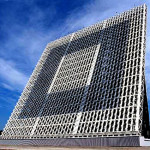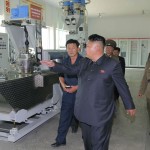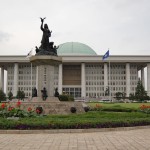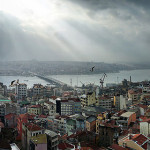- DETERRENCE: Russia to Upgrade Missile Attack Warning System
- DPRK: North Korea’s Real Annual GDP Growth
- GOVERNANCE AND CIVIL SOCIETY: Parties Face Calls for Reform after Elections
- CLIMATE CHANGE ADAPTATION: Technical Report: Designing a Climate Resilient Future: A Guide to Integrating Multiple Perspectives in Spatial Planning
 DETERRENCE: Russia to Upgrade Missile Attack Warning System, Tatyana Rusakova, Russia Beyond The Headlines, July 4, 2014
DETERRENCE: Russia to Upgrade Missile Attack Warning System, Tatyana Rusakova, Russia Beyond The Headlines, July 4, 2014
Russia’s last geostationary early warning satellite launched March 2012 has failed, leaving it almost blind to intercontinental missile attack. It has two high orbit satellites still that provide coverage of missile launches a few hours a day. It has long been blind to a US submarine launched missile attack from the Pacific due to gaps in its radar network.
- Russia Blinded By Loss of Missile Detection Satellite, The Moscow Times, June 25, 2014
- The Dead Hand: The Untold Story of the Cold War Arms Race and Its Dangerous Legacy, chapter 6, The Perimeter System, David Hoffman, Anchor Books, 2010, p. 153
- “If It’s Broke, Don’t Fix It,” Bulletin of the Atomic Scientists, Pavel Podvig, 61:4, July-August 2005, pp. 21–22
 DPRK: North Korea’s Real Annual GDP Growth, 1990-2013. Marcus Noland, North Korea: Witness to Transformation blog. (2 July 2014)
DPRK: North Korea’s Real Annual GDP Growth, 1990-2013. Marcus Noland, North Korea: Witness to Transformation blog. (2 July 2014)
The state of North Korea’s economy provides them with militarily significant asymmetries. On one hand a poor economy means North Korea’s military can only grow so large. However, their disconnect from much of the normal trade means they cannot suffer much more economic damage than they usually inflict on themselves, but they can gain serious leverage by threatening to destroy South Korea’s economy. If North Korea possesses an electromagnetic pulse (EMP) weapon they can seriously damage South Korea’s economy almost immediately. The United States, China, Japan and every country that uses computer chips would suffer as well if South Korea’s economy and chip manufacturing were crippled. Recent aid packages to North Korea may be leading indicators of a tentative relative thaw.
- Korean Ministry of Defense: North Korea may be developing an EMP weapon, (China) Global Times. (28 July 2014)
- S Korea offers USD 13.3 mn for UN aid projects in North. Business Standard. (11 August 2014)
- South Korea proposes high-level talks on reunions with North. Choe Sang-hun, New York Times. (11 August 2014)
 GOVERNANCE AND CIVIL SOCIETY: Parties Face Calls for Reform after Elections, Choi He-suk, Korea Herald (1 August 2014)
GOVERNANCE AND CIVIL SOCIETY: Parties Face Calls for Reform after Elections, Choi He-suk, Korea Herald (1 August 2014)
Last week’s elections served as a referendum on both the ROK ruling and opposition parties. While public dissatisfaction with the ruling party and administration in its handling of the Sewol ferry disaster remains, voters appeared to have been more dissatisfied with the opposition’s focus on attacking the ruling party and dearth of policy proposals.
- Co-chairmen quit amid election rubble, Kang Jin-kyu, Joongang Ilbo (1 August 2014)
- How South Korea’s liberals lost their way, Yong Kwon, The Diplomat (3 August 2014)
 CLIMATE CHANGE ADAPTATION: Technical Report: Designing a Climate Resilient Future: A Guide to Integrating Multiple Perspectives in Spatial Planning, Stephen Clune, John Martin and Ralph Horne, Victorian Centre for Climate Change Adaptation Research (VCCCAR), Victoria, Australia (2014)
CLIMATE CHANGE ADAPTATION: Technical Report: Designing a Climate Resilient Future: A Guide to Integrating Multiple Perspectives in Spatial Planning, Stephen Clune, John Martin and Ralph Horne, Victorian Centre for Climate Change Adaptation Research (VCCCAR), Victoria, Australia (2014)
An 18-month project (design-led decision support for regional climate change) undertaken by RMIT University-Melbourne, Australia used ‘Design Charrettes’ (involving a range of stakeholders with diverse skill sets for generating context specific spatial plans)to support local & regional communities in planning and adapting to future climate impacts.
- Resilient Urban Systems: A Socio-technical Study of Community Scale Climate Change Adaptation Initiatives, Ralph Horne et al., Victorian Centre for Climate Change Adaptation Research (VCCCAR), Victoria, Australia (2011)
- Assessing Resilient Urban Systems to Support Long Term Adaptation to Climate Change, Ralph Horne et al., Victorian Centre for Climate Change Adaptation Research (VCCCAR), Victoria, Australia (2011)
The Nautilus Peace and Security Weekly Report presents articles and full length reports each week in six categories: Austral security, nuclear deterrence, energy security, climate change and security, the DPRK, climate change adaptation and governance and civil society. Our team of contributors carefully select items that highlight the links between these themes and the three regions in which our offices are found—North America, Northeast Asia, and the Austral-Asia region.
- Subscribe to NAPSNet to receive free weekly email reportsEditor
Contributors:
- Deterrence: Peter Hayes
- DPRK: Roger Cavazos
- Governance and Civil Society: Dyana Mardon
- Energy Security: Nikhil Desai
- Climate Change Adaptation: Saleem Janjua

